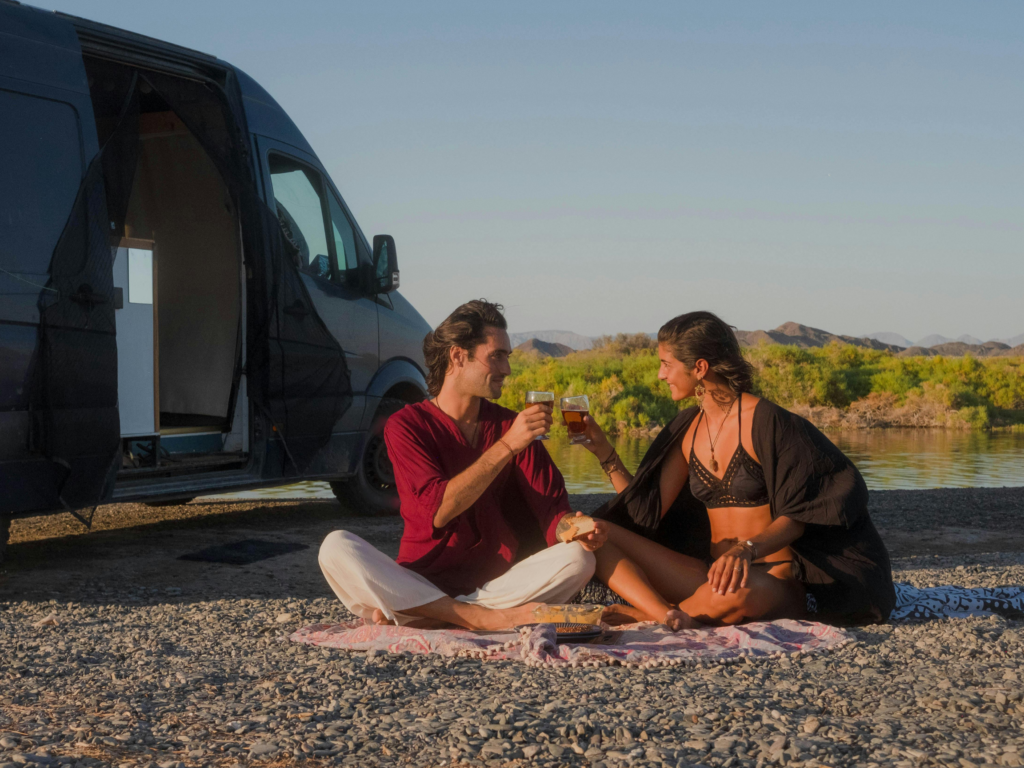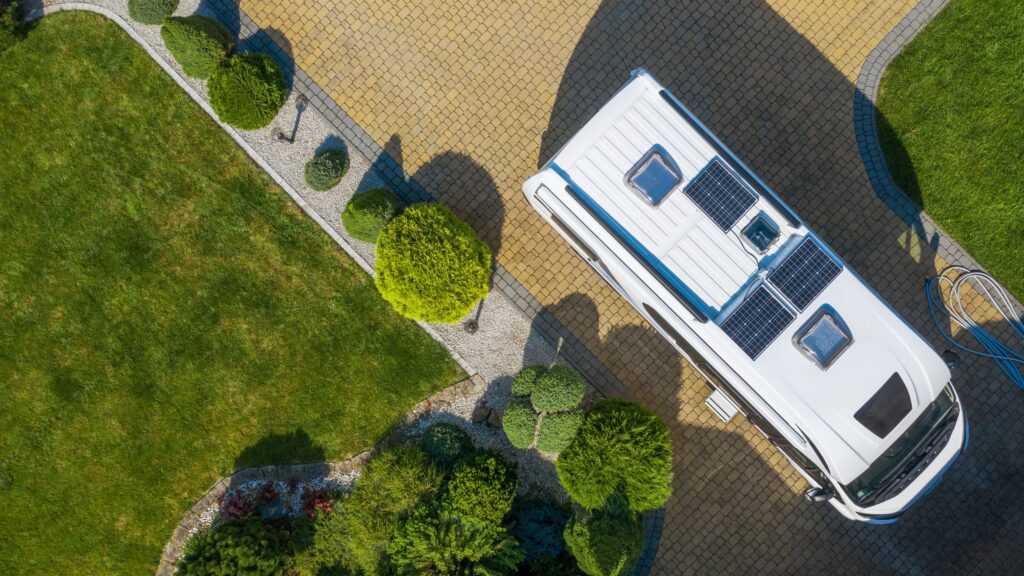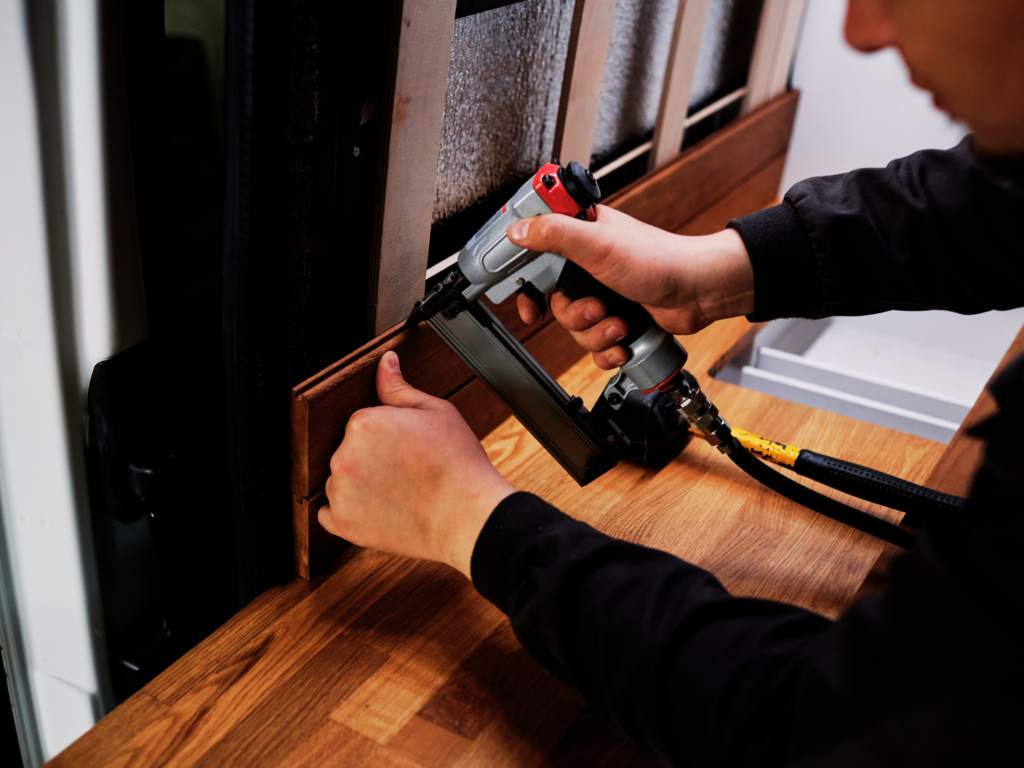When living van life, the most important thing to consider is your campervan water system. It doesn’t need to be fancy, but water is the most essential piece for survival, and if you plan to be off-grid for any length of time, having enough clean water to sustain yourself for a specific amount of time is crucial.
Yes, you can always grab a few gallon jugs of water from the grocery store, but that’s not very sustainable.
In this article, we’ll guide you through choosing the right DIY campervan water system for your van life needs, exploring various types of systems, their pros and cons, and crucial factors to consider.
Table of Contents
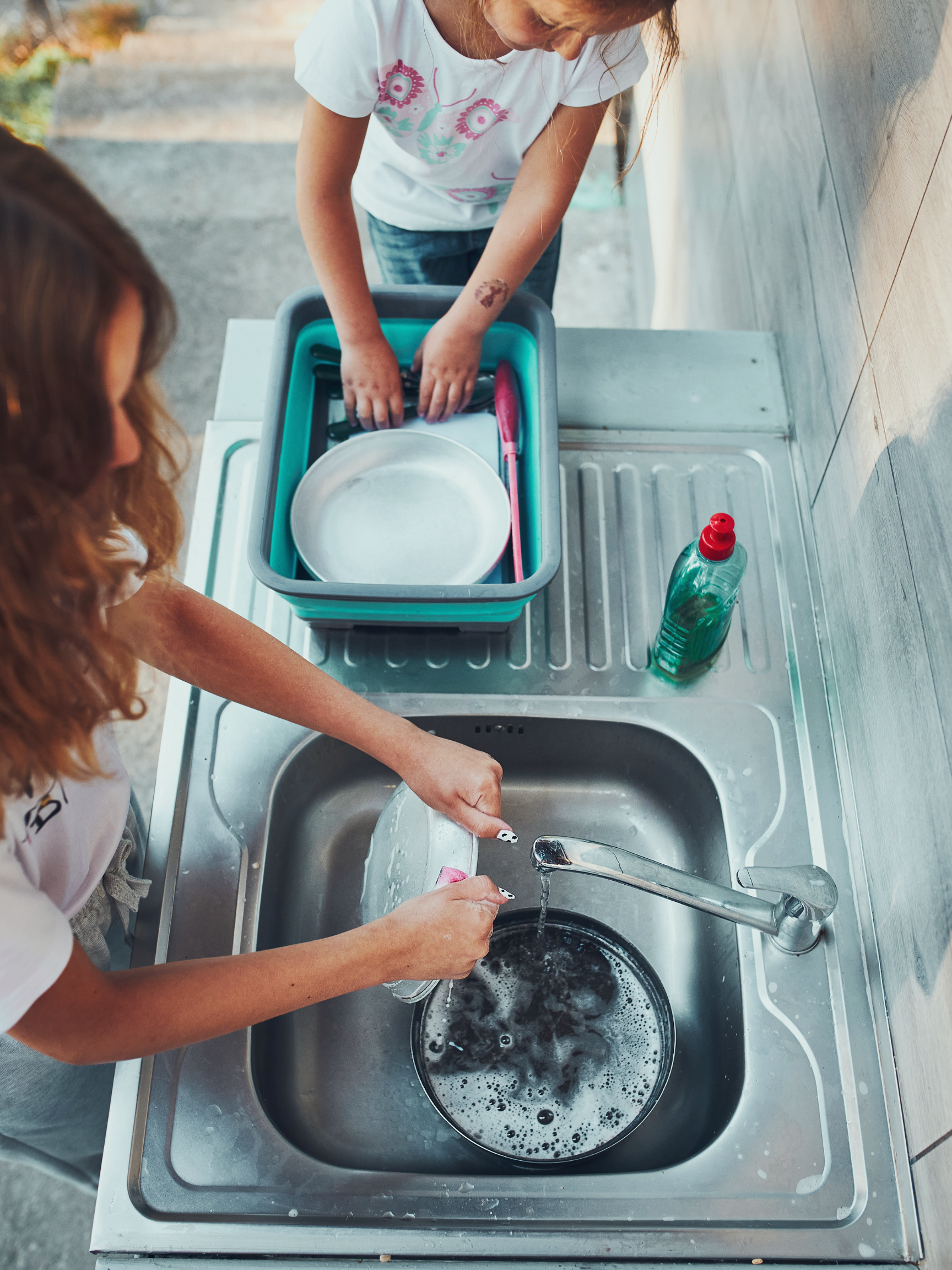
Types of Campervan Water Systems
Until you started looking up your options for your own campervan water system, you probably didn’t even realize how many are out there.
From sophisticated water systems with water heaters to simple jug-on-the-counter systems, there’s no right or wrong way to set up your campervan water system. What matters is that you have safe drinking water that aligns with your budget and your overall needs.
Here are the most common camper van water system types:
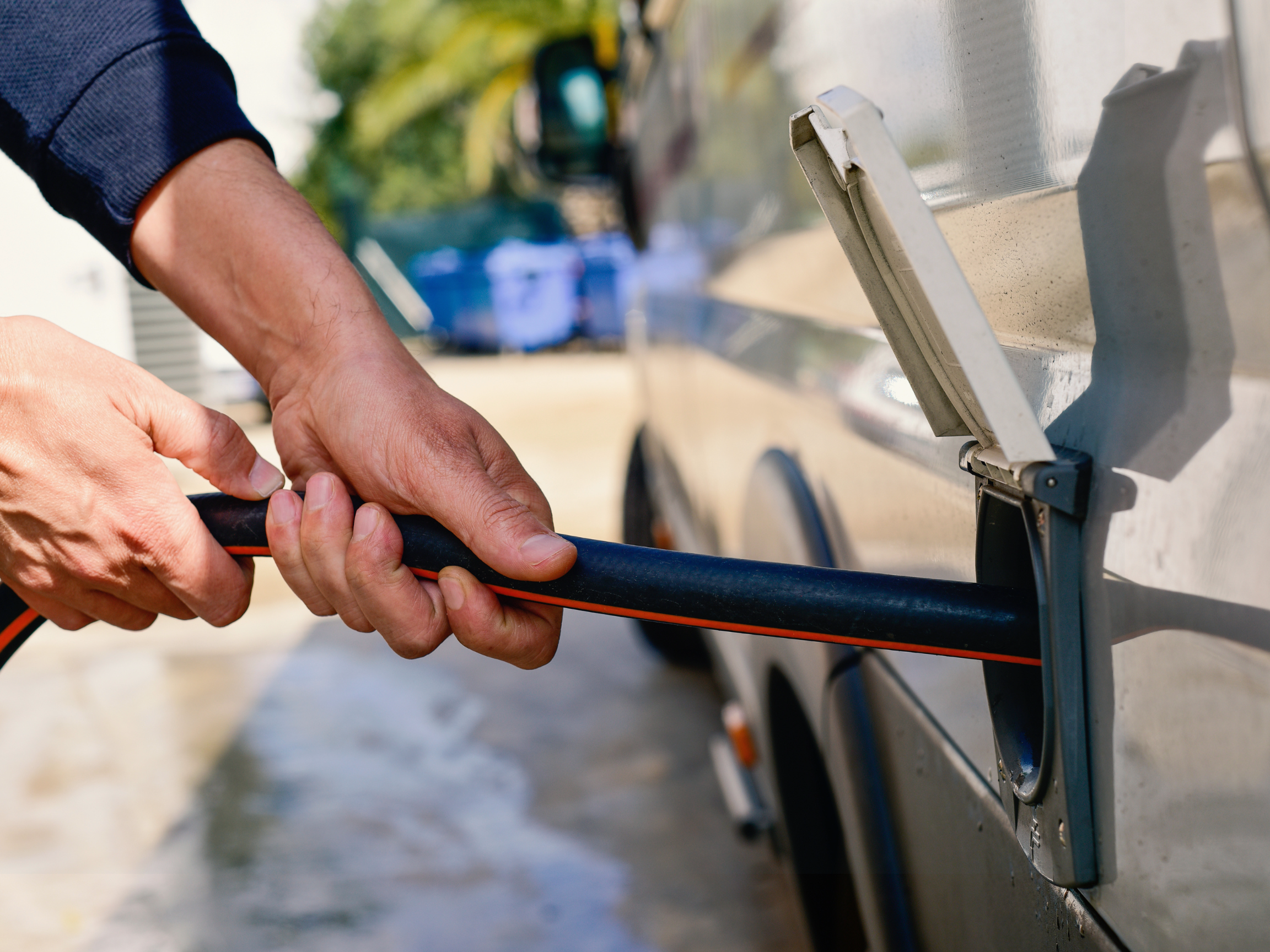
Onboard Fresh Water Tanks
Probably the most desired setup is having an onboard fresh water tank where you can store a generous amount of fresh water for you to use over the course of your trip.
An onboard fresh water tank can be anywhere from 10 to 40+ gallons and is typically filled from outside your campervan by connecting a hose to a potable water source and your water tank. You simply turn on the water at the source and fill your water tank.
Often, a filter is used between the water source and the fill connection on the campervan to ensure no particles get into your holding tank. Some people include a filtration system inside the campervan as well for an added layer of protection from contaminated water.
Once your fresh water tank is full, you can draw from it for all your camping water needs. Typically, you would install a 12v water pump that connects to your power system, and all you have to do is turn on a faucet to get fresh water.
Depending on how robust you want your water system, you can install a tankless water heater for an indoor shower or to have hot water on demand. Remember that the more robust your plumbing system is, the more advanced your electrical system will have to be to support the entire water system.
Pros of onboard freshwater tanks:
- Convenient access to water while inside the van.
- Typically larger capacity for extended off-grid stays.
- More time between refilling due to larger holding capacity.
Cons of onboard freshwater tanks:
- Adds weight to the van, impacting fuel efficiency.
- Requires space for installation.
- Can freeze in cold weather without proper insulation and heating.
- More difficult to find free refill stations that you can connect your fill hose to.
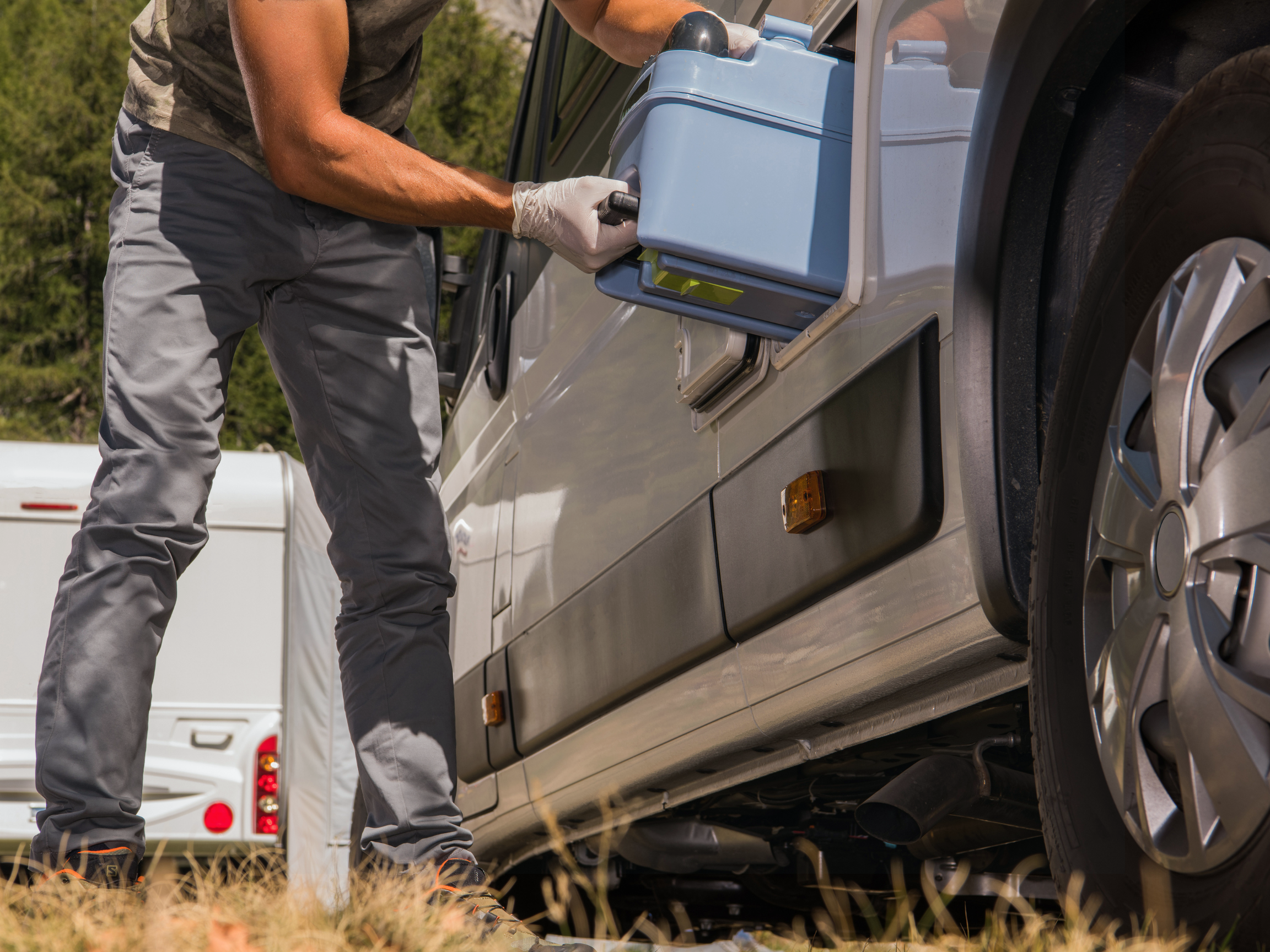
Portable Water Containers
The easiest and most common type of campervan water system is simply having portable, refillable water containers on board that you draw from and refill as needed.
These can be five- to seven-gallon canisters that you keep secured inside or a one or two-gallon container that you refill in grocery stores every few days and keep on your counter. It really all depends on how much water you need and how long you want to go between having to refill your portable water containers.
You can use a manual foot pump with larger containers for things like washing dishes if you have a sink setup. A gravity-fed water system works well with a smaller water tank up on your counter. If you have a battery system installed in your van, you can wire in a 12-volt water pump and have running water coming out of your sink!
Pros:
- Flexibility to refill at various sources.
- Lightweight and easy to transport.
- Can be used for other purposes (e.g., hiking, picnics).
Cons:
- Limited water supply compared to onboard tanks.
- Requires manual refilling, potentially more frequent stops.
- Takes up interior space when not in use.
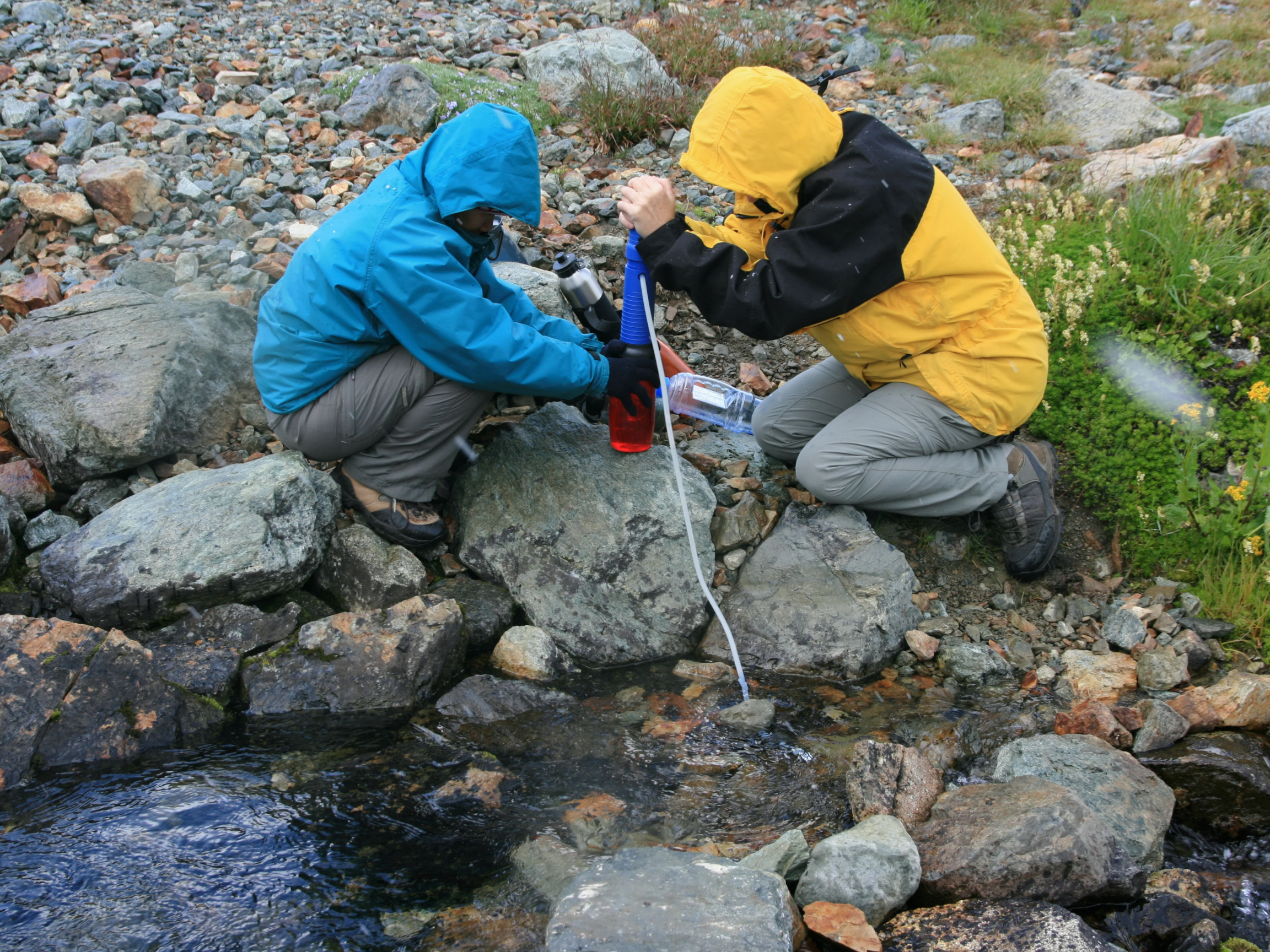
Water Filtration Systems
A true off-grid water system can filter water from almost any freshwater source. This means you can have an indefinite amount of potable water if you’re near a stream, creek, river, or lake.
With a water filtration system, you have one hose that you submerge in the water source, an external electric or hand pump attached to the hose, and a robust filter that the water passes through before going into your holding tank or water jug.
This system is much like how you might filter your water on a backpacking trip, but with a much bigger filter and a full-sized hose.
Pros:
- Ensures clean and safe drinking water.
- Suitable for both onboard and portable setups.
- Reduces the need to carry large quantities of water.
Cons:
- Initial investment in filtration equipment.
- Requires regular maintenance and filter replacement.
- May not remove all contaminants (depending on the system).
Additional Components of a Campervan Water System
Yes, a freshwater tank is the heart of your water system, but there are additional components that you will need. Your camper van plumbing doesn’t have to include all (or any) of these items, but it’s got to know what your options are and determine what will work best for your lifestyle.
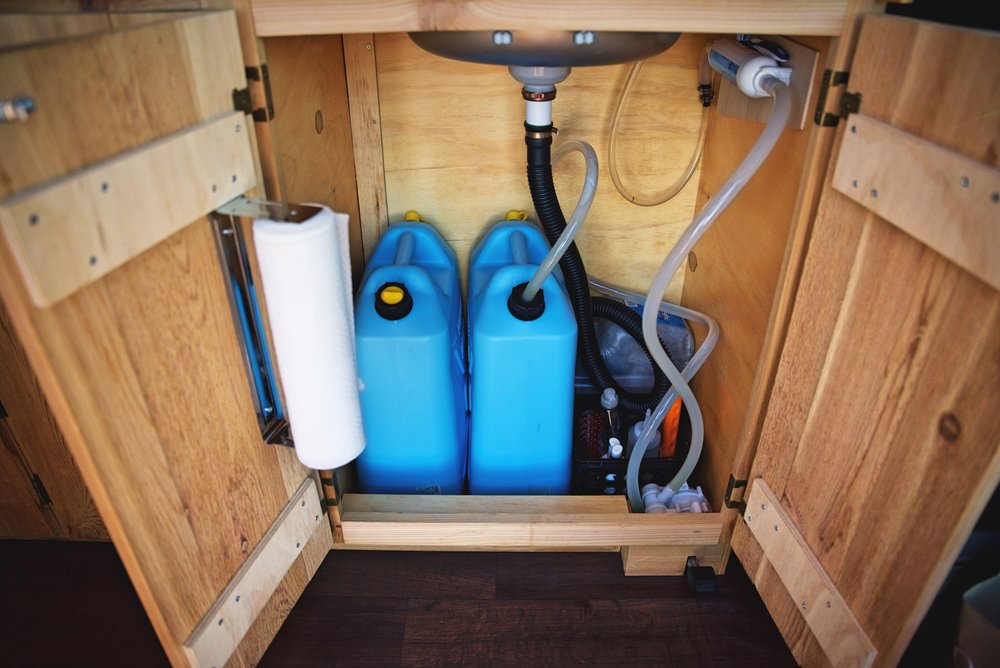
Grey Water Tank
A grey water tank is simply a waste water tank for the dirty water that is used for washing your hands, doing dishes, rinsing veggies, and other simple cleaning tasks.
Ideally, you would always use biodegradable cleansers and soaps so your grey water can be disposed of more easily. If you use any harsh cleanser, like bleach, your grey water tanks should always be emptied at a dump station.
Some people let their sink drain right out onto the ground through a waste pipe that goes through the floor of their campervan. We’re not really a fan of this method, though, because dumping grey water right onto the ground underneath you can attract animals from the smell. It’s also very inconvenient if you’re stealth camping in the city since you wouldn’t want grey water pooling underneath your campervan on the pavement while parked.
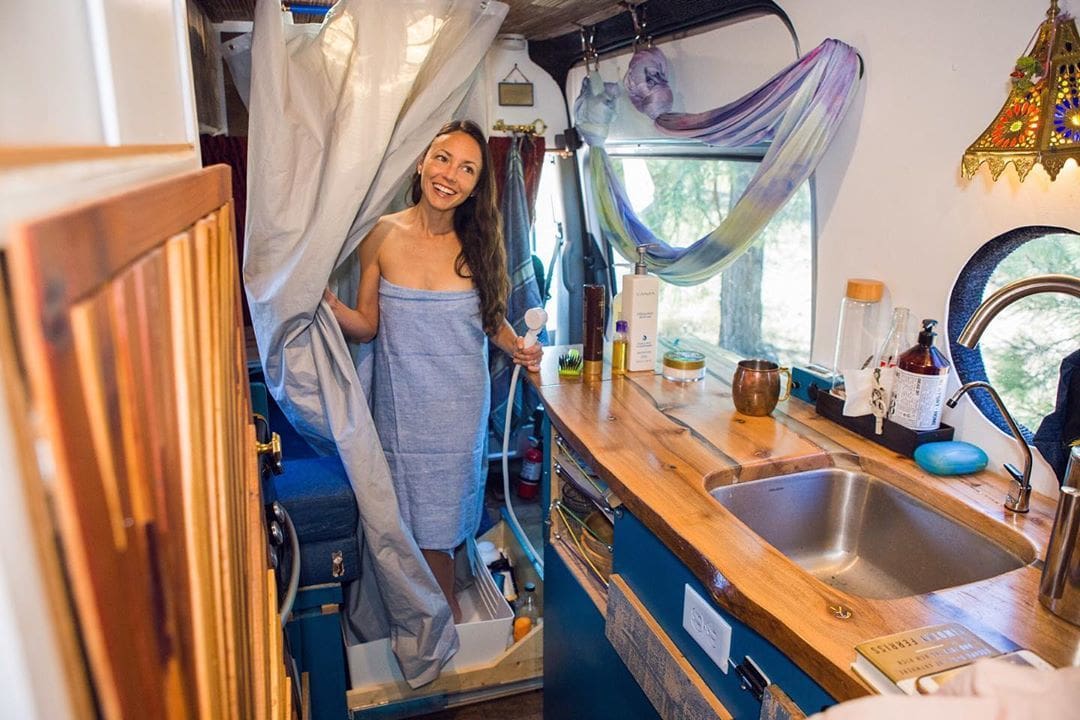
Water Pump
Necessary to nearly any van water system to pump water out of a large fresh water tank is a water pump.
This can be a manual pump or an electric pump that is wired into your campervan electrical system
Hot Water Heater
It’s not as common to have a campervan water heater on board, but it’s a luxury some people find reasonable.
An on-demand hot water heater is the most popular and economical for campervans. Usually, these are used to have instant hot water at your sink, or even allow you to have a hot shower from a shower head attached to your sink, on a connection for an outdoor shower outside your van, or in a small shower room inside your campervan.
Factors to Consider for a Campervan Water System
As with all things vanlife, there are things that you should consider when deciding on what type of campervan water system you choose. From weather temperatures to how long you plan to be off-grid to accessibility, there’s a water system for everyone.
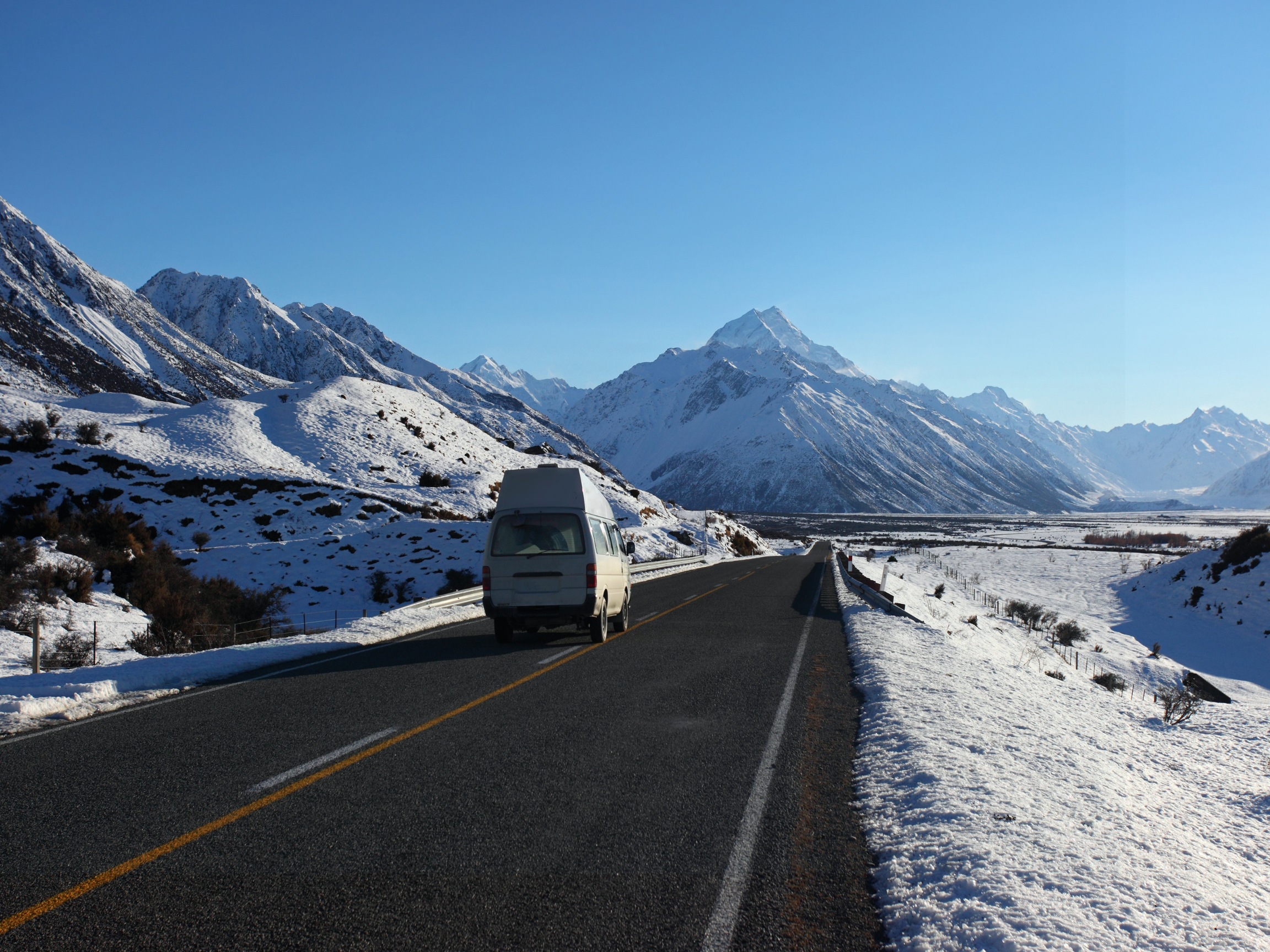
Climate and Weather Conditions
Depending on where you plan to travel, you’ll need to consider various types of weather conditions.
- Opt for an on-board water tank instead of an underslung water tank that’s open to the elements.
- Ensure your water system is insulated to prevent freezing.
- Always drain your water tank, water pump, and any water pipes completely if you plan to park your campervan unused in the winter for any length of time.
- If you’re parking your campervan for an extended period and not planning to use it, put an RV antifreeze solution in your tank and run it through your water pump.
Hot Weather:
- Always use freshwater-grade tanks or containers. Containers not made for freshwater can leach chemicals into your water in extreme heat.
- Shield your water containers from direct sunlight.
- If water has been sitting in your water tank for an extended period of time in the heat, flush your water system with fresh water before heading out on your next trip.
Off-Grid Time
Obviously, you’ll need to have enough water on hand to last for the amount of time you plan to be off-grid.
Water Consumption Estimation:
- Calculate how much fresh water you use daily to estimate how long your supply will last.
- Don’t forget about water for your pets!
- Consider keeping an “emergency gallon” of water with you if you get stuck and need extra water while waiting for a tow.
- If you’re concerned about how long your water will last and will be camping near a water source, consider bringing a water filtration system
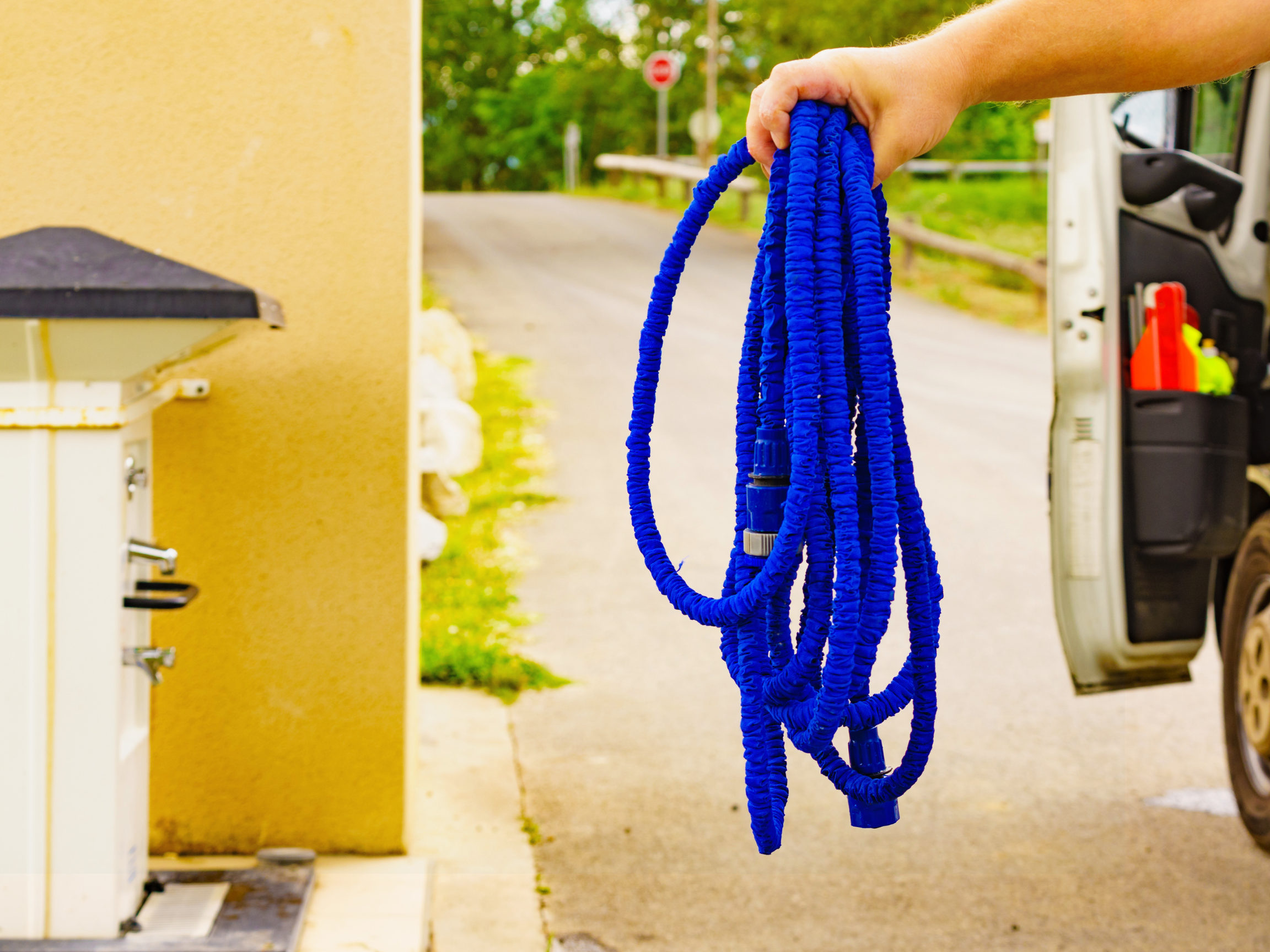
Accessibility to Water Sources
Apps like iOverlander will help you determine if there are plentiful water refill stations nearby. Always check ahead to ensure you know where you can refill your water tanks.
Campground Amenities:
- Choose campgrounds with water hookups for convenience.
- Verify the availability of potable water sources.
Wild Camping and Remote Locations:
- Top off your water tanks before every trip to remote locations.
- Invest in a robust off-grid water solution.
- Carry backup water purification methods for unreliable sources.
Weight Constraints
Water is heavy. 8.34 pounds per gallon, to be exact. Five gallons of water is 41.7 pounds, and a 40-gallon tank will weigh 334 pounds!
- If you install a large freshwater tank, be conscious of placement. Install it in the middle of your garage if possible, or balance it on the opposite side of your battery bank, which will also be quite heavy.
- Know the weight limits of your campervan. Adding a large water system might bring you over the weight limit of your vehicle and cause mechanical issues down the road, as well as unsafe driving conditions.
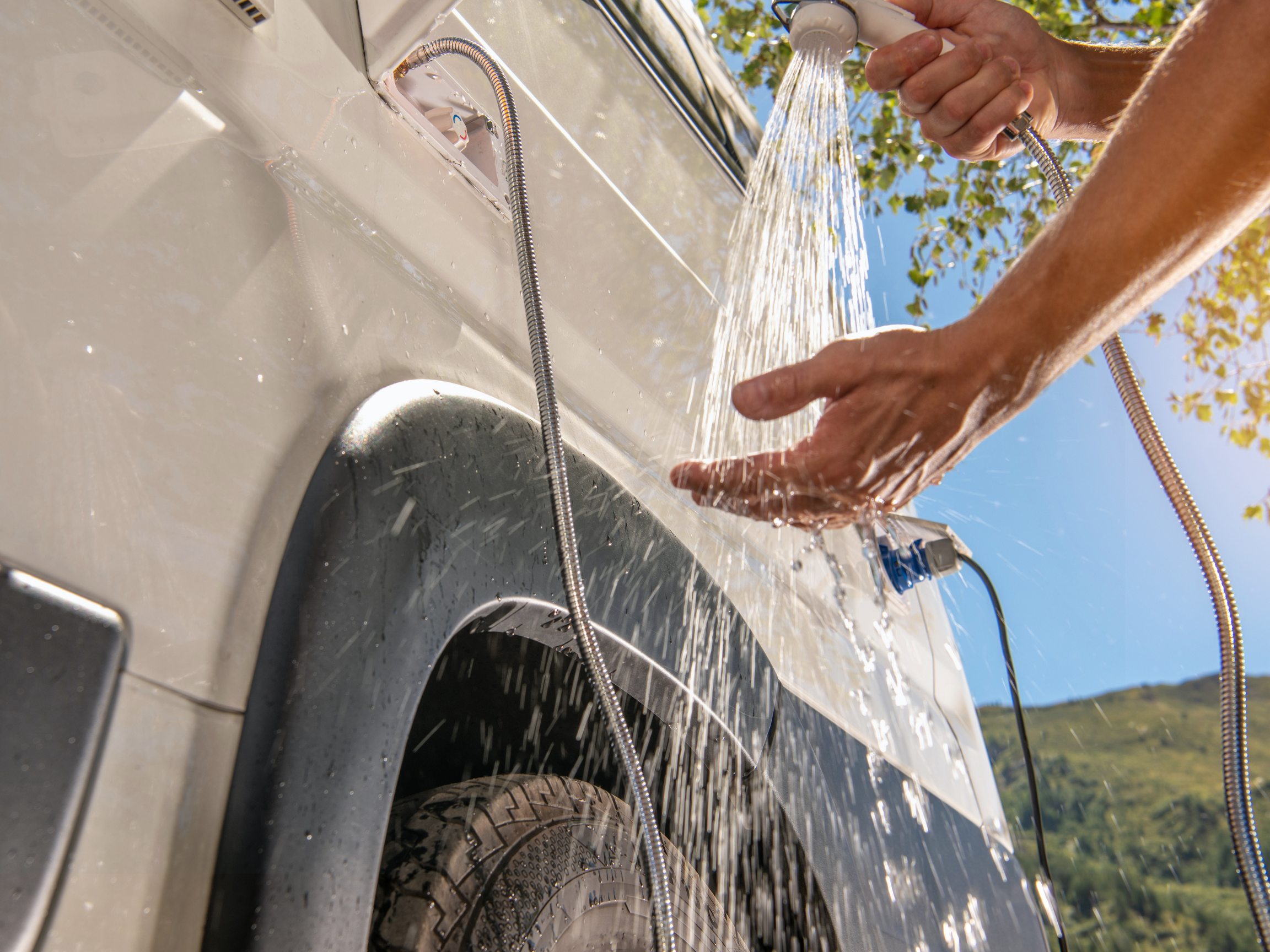
Summary
Choosing the right campervan water system is a critical aspect of your van life adventure. By considering factors such as climate, off-grid time, and accessibility, you can make an informed decision on what type of water system is right for you.
Whether you opt for onboard tanks, portable containers, or advanced filtration systems, remember that maintaining and conserving your water supply is key to a successful and enjoyable van life journey. Stay hydrated, stay safe, and enjoy the endless horizons as you Find Your Outside™!
